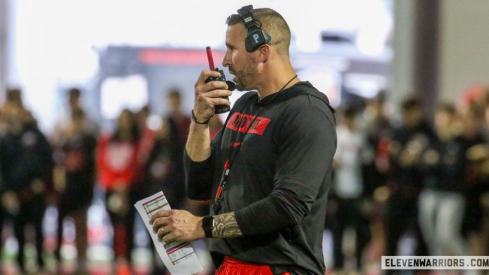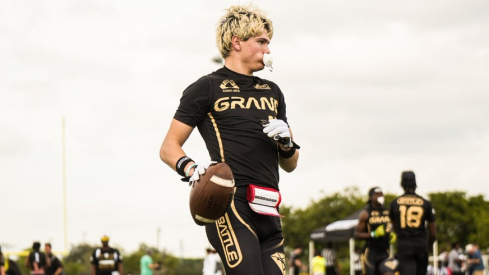Ever since Jim Tressel was caught covering up his players' felonies improper trinket and equipment sales which led to his subsequent dismissal resignation retirement, the outside world has been aghast at Ohio's reaction to its shamed coach: They still respect this liar?
Every tribute from a planned sideline apparel nod by Ohio high school coaches to respectful online gestures to planned marches on Tressel's domicile has been met with eye-rolling scorn over a man who has hoodwinked a state of nearly 12 million people into thinking he is anything but a serial cheater.
How deluded could Ohioans be to still think fondly of a guy who was caught lying every single day of his life between April 2010 and this past February?
As the sentimental eulogies of the Tressel era emerged following his abrupt termination, the flagship Michigan blog changed its tagline to, "save us the hymnals, cooler poopers." It's a two-pronged jab juvenile enough to send Buckeye scribes scrambling for new, fun ways to describe the perspiration that seeps like drawn butter from Brady Hoke's floppy jowls as his sloth fills the ample void left by Charlie Weis' absence. But those are fat Fred Flintstone-jokes for another day.
It is a fair question, however: Why are Buckeye fans - albeit resentful of his sloppy complicity in exacerbating the mess that otherwise wouldn't have led to his demise - still fond of a proven cheater? Yeah, yeah, the good outweighed the bad, he did so much for Ohio, etc, etc, etc - you've heard this before, and it's absolutely true. But it doesn't seem to be an acceptable reason.
Sometimes questions are best answered with other questions: Why shouldn't Tressel, Ohio State football's greatest program steward, also be lauded the same as other legendary coaches?
the Bear & Lou Holtz
You cannot escape Paul Bryant in Tuscaloosa. There is a huge stadium, a museum - that's on a street - and a university building that all bear his name. Alabama has a storied history of NCAA violations (there have only been four seasons since 1995 when the Tide weren't on probation or facing sanctions) yet Bryant isn't readily associated with cheating. He's associated with winning.
Before coming to Alabama in 1958, Bryant was at Texas A&M. He arrived there from Kentucky in 1954 and quickly found out what everyone else already knew about College Station: Nobody good wanted to go there, for a whole bunch of valid reasons. No chicks. Military uniforms. No spotlight. No chicks. A&M was rarely good. And most of all, no chicks.
By 1955, Texas A&M was significantly tougher, better-coached, successful and also on probation with a postseason ban for recruiting violations that occurred on Bryant's watch, or what SWC programs commonly referred to as "the usual."
Bryant later admitted that A&M boosters "probably paid some of the boys" as the rest of the conference took notice that Bryant's initial recruiting haul was strikingly different from the usual crop of Aggies.
Boosters used to be intimately involved in the recruiting process without most of the restrictions that schools have today. Bryant's only documented NCAA troubles came from that brief stint in College Station, but consider the most prominent branches of his coaching tree:
1) Jackie Sherill, who played for Bryant at Alabama, later coached Texas A&M just as his mentor did. On his watch the NCAA hit the Aggie football program with Lack of Institutional Control, unethical conduct and improper benefits, leading to Sherill's resignation. He eventually found his way back into coaching at Mississippi State, which was hit with four years of probation while he was there. In both instances, it was always a third party responsible for cheating. He retired in 2003.
2) Pat Dye started his coaching career under Bryant at Alabama, where he stayed for eight seasons. He eventually took over at Auburn, where he won over 70% of his games. His career ended when the NCAA caught AU boosters - and Dye's AU assistants - paying a player, which put the school on probation. He was both the AD and head coach at the time. As with Sherill - and his mentor, Bryant - it was a third party responsible for the cheating. Dye retired in 1992. The playing surface at Auburn is named for him.
3) Gene Stallings was one of Bryant's "Junction Boys" at Texas A&M and also coached under Bryant at Alabama. He was the Crimson Tide's head coach for six years during the 1990s. Alabama was found to have committed four major violations on his watch, including his complicit involvement with his athletic director to falsify the eligibility status for defensive back Antonio Langham. As you might suspect, there were vacated wins, probation, postseason and conference championship game bans levied.
4) Charley Pell played and coached for Bryant at Alabama. He and his staff committed major recruiting violations when he was in charge at Clemson, which resulted in the Tigers getting two years of probation after Pell left to take over at Florida. He was eventually fired as the Gators' head coach after the NCAA found he and his staff committed 59 (!) violations which led to scholarship reductions, probation, a postseason ban and a two-year live television ban.
That old expression about apples not falling far from the tree is one of the reasons that Michigan State has been pro-actively defensive about distancing Mark Dantonio from his disgraced mentor. As for Bryant, that's a lot of bad apples. Four of the most notorious cheaters in college football history played and/or coached for him.
There's a reason the Bear's legacy isn't defined by having multiple assistants on the NCAA's naughty list or having the justice hammer come down on his famous A&M squad: It shouldn't be. If you think Tressel's Youngstown connections or Ted Sarniak always seemed shady, you don't know much about Texas oil men or southern boosters today, let alone during the relative lawlessness of Bryant's era.
Bryant won a whole bunch of national championships and was successful everywhere he coached. At each of his stops where he coached he's considered the best coach in school history. Sounds familiar?
Lou Holtz was supposed to replace Woody Hayes. The problem was that Holtz publically stated his desire to replace the guy who replaced Woody Hayes. At the dawn of the Earle Bruce era, Holtz was at Arkansas, where he would eventually be terminated by Frank Broyles for "losing the fan base."
 Notre Dame's statue for the probationiest coach in CFB history
Notre Dame's statue for the probationiest coach in CFB historyAfter Arkansas, Holtz's coaching career demonstrated remarkable consistency:
1) He took over at Minnesota, which eventually earned NCAA probation and a postseason ban after multiple violations that included Holtz paying players.
2) He then took over at Notre Dame, which eventually earned NCAA probation and scholarship reductions after Holtz and his staff learned of improper benefits and deliberately did nothing to stop or report them. (Doing what Holtz did today turns your school into a cesspool.)
3) His final stop was at South Carolina, which eventually earned NCAA probation for ten violations, including Lack of Institutional Control for impermissible tutoring and offseason workouts (or what Michigan might dismiss as "too much stretching.")
Holtz, just like his mentor Hayes, retired abruptly after an unfortunate fight against Clemson.
Despite a career littered with transgressions, earlier this summer Notre Dame awarded Holtz - irony alert - an honorary Doctor of Laws degree. This came three years after the statue of him that you see above was unveiled in South Bend.
And to think that you might feel conflicted about admiring Tressel's 25-year career. Holtz is a subject that George Dohrmann, Notre Dame graduate and Sports Illustrated investigative reporter, never touched in his career. (How deep did that go, George?)
You're Not Allowed to Speak Ill of John Wooden
The Wizard of Westwood, who died last summer, still has an active Web site. It's sponsored by McDonalds.

If NCAA sports had an undisputed King of Willful Ignorance, it would be Wooden and second place would be vacated out of respect for how successful he was in ignoring how Sam Gilbert delivered him the nation's best talent for the better part of ten NCAA titles.
Lost in the story of Wooden, legendary teacher, coach and one of basketball's most beloved patriarchs is that he coached for 15 years without notching any national titles. Enter Gilbert, who helped deliver the country's best talent to UCLA and all of a sudden this previously unremarkable coach wins the national championship in 10 out of 12 seasons. Explanation: It was wizardry!
Part of a legacy is how the public at large decides how you'll be remembered. The public - and especially the NCAA - decided that Wooden was a wizard, not a willfully ignorant accessory to a ten-year recruiting racket.
Bobby Bowden also benefited from this kind of treatment, albeit more of a coach class variety, that has him enjoying a reputation as America's folksy grandpa despite scandal after scandal occurring on his watch in Tallahassee. "How was he supposed to know that over half of his team was emptying the shelves at the local Foot Locker?"
While both ambitious and lazy journalists dig up and remind the masses of Tressel's past (even the tale of indefinitely-unverifiable fixed football camp raffle from 30 years ago is immune to the noble copy editor's delete key) Bowden, Wooden, Holtz - who is employed by the company that controls the American sports narrative - and many others have been deemed untouchable. That's probably a good thing.
Sports, especially of the college variety, could easily become an exhausting exercise in trolling historiography if we're going to retroactively go back and find all of the warts that were overlooked either deliberately or via cognitive dissonance. The contributions of these coaches to their schools and the game that they coached at large significantly outweigh their transgressions.
We're very selective in how we choose to remember coaches. John Cooper couldn't beat Michigan (never mind all of his other games, where he beat nearly everybody). Lloyd Carr couldn't beat Ohio State (except when he did, or that one time when he beat everybody). Fielding Yost wasn't a shady, sore loser; he's the guy that basically created Michigan's athletic department. Bob Knight threw a chair. Woody punched a player. If these guys were topics on Family Feud, you just read each of their top answers on the board.
There is no shame in remembering and admiring Tressel for his contributions to Ohio State and football beyond his ten months of deliberate silence. The entire episode received an egregiously disproportionate amount of media attention to which LSU, Auburn, Alabama, Texas, Oregon, Georgia Tech, Tennessee, Oklahoma and North Carolina all benefited. On behalf of Ohio State: You're welcome.
Some programs, especially those whose conferences have certain media partnerships, are considered untouchable. Similarly, some public figures are just deemed uninteresting. Tressel and Ohio State are neither.
It's understandably challenging for some people to grasp that the Ohio perspective of Tressel doesn't completely overlap with what they've read and seen in the coverage over the past several months: He was never their beloved coach. Perhaps they might feel differently if he was.

